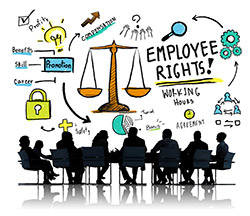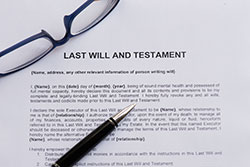|
New York Real Estate & Estate Planning Blog
Monday, December 7, 2015
 The law allows a person preparing a will to have almost complete control over his or her assets after the testator passes on, but there are limits to such power. A person can restrict a property from being sold, or make sure that it is used for a specific purpose. A property can be bequeathed to a family member as long on condition that the person maintains the family business in a specific city, or exercises daily, or places flowers on the deceased's grave every week, or engages in any other behavior the testator desires. This freedom, however, is not without limits. The time limit on this ability is called the rule against perpetuities. The rule is also referred to as the “dead man’s hand” statute.
The rule against perpetuities is complex and rarely utilized. At the time of the passing of the testator, the heirs of the estate are locked in. These heirs are referred to as “lives in being.” For the purposes of this rule, if a child is conceived but not yet born at the time of the testator’s death, it will be considered a life in being. Once the last living heir named in the will passes away, the restrictions on the property will continue in place as the testator desired for 21 years. The idea is that a testator may control his assets for a full generation after his or her death. The rule is notoriously difficult to apply properly. When it does apply, the conditions on the bequest are abandoned and the gift returns to the residual estate.
What makes this rule so confusing is that, when an individual writes a will, he or she may make gifts to potential children or grandchildren. These children and grandchildren, however, may not be born until years later. If a child has been born at the time the decedent passes away, he or she is subject to the restrictions on the bequest during his or her lifetime. If a grandchild is conceived and born after the decedent’s death, however, the child may avoid the restrictions 21 years after the death of the last heir alive at the time of the decedent’s death. There is no way to predict when this might occur. The rule is archaic and easily avoided. A knowledgeable attorney can help a person planning his or her estate set up an equitable trust. Similar to a will, a trust may impose conditions on the use of assets, but is not subject to the rule against perpetuities. There are other advantages to a trust, but one of the most important is avoiding this unpredictable and confusing rule.
Monday, November 30, 2015

Relationships between employers and employees are regulated under various federal laws. It is essential to be aware of these regulations. Those who violate their provisions risk lawsuits and penalties for failure to comply.
Family Medical Leave Act
Under the Family Medical Leave Act, or FMLA, an employee is afforded up to 12 weeks of unpaid leave to recover from pregnancy, serious illness, or to aid a sick family member. No adverse employment actions are permitted upon return. That means after 12 weeks of such leave, an employee must be permitted to return to their previous position with no reduction of hours or pay.
Federal Minimum Wage
The federal minimum wage is presently $7.25 an hour. Some local governments have increased the minimum wage above the federal level. For non-salaried, non-commissioned employees, an employer is required to pay one and a half times the normal hourly wage for any hours worked in excess of 40 hours a week.
Harassment and Discrimination
An employee has the right to work in a place free from harassment and discrimination. Sexual harassment can take the form of unwelcome sexual advances or a hostile work environment. Adverse employment actions taken for the reason of race, religion, gender, and in some states, sexual orientation, may result in a lawsuit. It is also against the law for an employee who files a lawsuit for workplace discrimination, sexual harassment or another wrong doing to face retaliation for whistleblowing.
Federal Occupational Safety and Health Administration
Under Federal Occupational Safety and Health Administration (OSHA) regulations, an employee has the right to work in an environment free of dangerous conditions, safety hazards and toxic substances. Employees dealing with potentially dangerous equipment must be trained to use it safely, and all employees should undergo training on workplace safety. The OSHA handbook has 19 subsections, each dealing with a specific topic such as fire prevention, heavy machinery, hazardous materials and walking/working surfaces.
National Labor Rights Act
The National Labor Rights Act, or NLRA, allows employees to organize a union to negotiate working conditions and compensation through collective bargaining and the use of strikes. The NLRA does not apply to public employees, domestic employees, agricultural employees, railroad employees, airline employees, supervisors, management, independent contractors or close relatives of the owners of the company that employs them.
Monday, November 16, 2015

There are several reasons that a will may prove invalid. It is important for testators to be aware of these pitfalls in order to avoid them.
Improper Execution
The requirements vary from state to state, but most states require a valid will to be witnessed by two people not named in the will. Some jurisdictions require the document to be notarized as well. Although these restrictions may be relaxed if the will is holographic (handwritten), it is best to satisfy these requirements to ensure that the testamentary document will be honored by the probate court.
Lack of Testamentary Capacity
Anyone over the age of 18 is presumed to understand what a will is. At the end of life, individuals are often not in the best state of mind. If court finds that an individual is suffering from dementia, is under the influence of drugs or alcohol, or is incapable of understanding the document being executed for some other reason, the court may invalidate the will on the grounds that the individual does not have testamentary capacity.
Replacement by a Later Will
Whenever an individual writes a new will, it invalidates all wills made previously. This means that a will might be believed to be valid for months until a more recently executed document surfaces. The newest will always takes precedence, controlling how assets should be distributed.
Lack of Required Content
Every will is required to contain certain provisions to carry out its purpose. These provisions, ensure that the testator understands the reason for executing the document. Although these provisions vary from state to state, some are common to all jurisdictions. It should be clear that the document is intended to be a will. The document should demonstrate an individual’s wishes in regard to what should happen to his or her property after death. A proper will should also include a provision to appoint an executor to act as an agent for the estate and enforce the terms of the will. If the document lacks any of these provisions, the will may be declared invalid.
Undue influence or fraud
A will that was executed under undue influence, coercion or fraud will be invalidated by a court. If a will has been presented to a testator for a signature as if it were any other document, like a power of attorney or a business contract, the court will find that the will was fraudulently obtained and will not honor it. If an individual providing end of life care with exclusive access to the testator threatens to stop care unless a will is modified, that modification is considered to be the result of undue influence and the court will not accept it.
Monday, November 2, 2015

There are many reasons why a person might leave a spouse or another loved one out of his or her will. It is possible that the will in question was executed prior to a marriage and was never properly updated. It may also be the case that the husband and wife, though still technically married, are estranged, and do not contribute to one another’s support. An end of life revelation of a past infidelity may anger a spouse enough to rewrite his or her last will and testament. Individuals may make rash decisions to disinherit spouses based on a single argument or misunderstanding. This can be exacerbated by symptoms of dementia. Regardless of the reason, a person who is not named in his or her spouse’s will may petition the court for the spousal share to receive a portion of the estate.
The spousal share of an estate, also called an elective share, is a holdover from the concept of dower in English common law. Traditionally, dower is a portion of a man’s estate guaranteed to a wife when she is widowed to ensure that she does not fall into poverty after her husband dies. The practice continues today without the same restrictions on gender. Every state in America has a provision in its laws to protect an individual whose spouse dies from being left with nothing. Similar provisions for children also exist in some states. Attempts have been made to introduce legislation to protect unmarried romantic partners the same way as married couples, but these attempts have had little success.
The structure of these protections vary from state to state. The value of the estate for the purposes of establishing the spousal share may include the widow’s assets depending on the jurisdiction. Some states provide a widowed spouse a larger share of the deceased’s estate than others, but almost every state prohibits an individual from disinheriting a spouse entirely. The one state that does not permit an elective share to the spouse in a probate case requires that an estate pay a disinherited spouse financial support for up to one year after the death.
Monday, October 26, 2015

A life estate is a special designation in probate law referring to a gift to a family member that lasts as long as the life of the recipient. If an individual uses a life estate as part of his or her estate plan, whatever is bequeathed under the life estate will revert back to the residual estate upon the death of the life estate recipient. It is most common in scenarios where an individual starts a new family without children later in life and wants to ensure that the present spouse is taken care of for the remainder of her or his life. The owner of a life estate is called a life tenant. A life estate is often used as an alternative to a trust because it provides the life tenant with more control over the transferred asset.
A life tenant may treat an asset as his or her own. A home may be rented to tenants for income. The life tenant may sell his or her interest in the property to the heirs of the residual estate or to third parties. If the property is sold to a third party, that third party must surrender the property to the residual heirs upon the death of the life tenant.
Though the property belongs to the life tenant, the life tenant has a duty to the residual heirs to keep the property reasonably maintained and in good condition. He or she has an obligation to avoid mortgage arrearages and tax liens while in possession of the property. Exploiting natural resources on the property may be restricted during a life tenancy. A life tenant may not bequeath his or her interest in a life estate through a will because that interest immediately terminates upon the life tenant’s death. Significant changes to the property need to be agreed upon by all parties.
Though there are benefits, there are also drawbacks to establishing a life estate as part of an estate plan. The action could create estate tax issues for the tenant’s estate. In addition, creditors of the tenant may attach liens on the property, creating complicated legal issues for the heirs of the residual estate.
Monday, October 19, 2015

1. Buy the assets instead of the business
Purchasing a small business includes assuming any debt accrued by the business. The buyer is also purchasing any potential liability from accidents or misconduct of the seller that occurred prior to the sale. This can be avoided if the new owner purchases the assets instead of buying the entire business. Taking this action also resets the tax basis of those assets to the current purchase price instead of the price the seller paid for them.
It is important to make sure that the assets are being sold unencumbered, meaning that they were not financed since any debts accrued may follow the assets. The assets, such as machinery or furniture, should be inspected and tested to make sure they are in good condition and fully functional. Also, the buyer should consider paying in installments so that if assets turn out to be damaged and require repair or liabilities are discovered down the line, deductions can be made from future payments. Purchasing assets is usually the better option for a small business owner. It is always wise to consult with an attorney to determine your best options.
2. Examine the lease
Leasing space is one of the most expensive aspects of running a business. Before purchasing, the small business owner should review all potential expenses, paying particularly careful attention to the lease. The purchaser should confer with the landlord to confirm that:
No problems will arise in the lease if a transfer occurs;
No back rent is owed; and
The premises are in good condition.
If the buyer intends to renegotiate the lease, it should be done prior to the purchase.
3. Evaluate the landlord
If there are other tenants in the area, the potential buyer should question them in order to assess the landlord's trustworthiness. If other tenants have had problems with the landlord, it is likely that the new owner will have issues as well. If the prospective landlord does not have the reputation of being honest or reliable, it probably does not make sense to go through with the purchase.
4. Ensure a smooth transition
Many sellers do their best to hide the fact that the business is being sold from their employees. This can present serious difficulties for the new owner since, in order to continue operations after a purchase, it is crucial that key employees remain on staff to help ease the transition. A potential buyer should always speak with existing employees to confirm their competence and willingness to stay on. These key employees have ongoing experience in running the day-to-day operations of the business and are likely to be aware of problems with running the business that have not been revealed by the seller and are not immediately apparent to newcomers.
At times, the seller stays on to consult with the buyer for months after the sale to ensure a smooth transition. In any event, the buyer should always make sure that the seller signs a non-compete provision to prevent future conflicts.
Monday, October 5, 2015

Will - a written document specifying a person’s wishes concerning his or her property distribution upon his or her death.
In order to be enforced by a court of law, a will must be signed in accordance with the applicable wills act.
Testator/Testatrix - the person who signs the will.
Heirs - beneficiaries of an estate.
Executor/Executrix - the individual given authority by the testator to make decisions to put the testator’s written directions into effect.
Once the will is entered into probate, the executor’s signature is equivalent to the testator’s. The executor has a legal duty to the heirs of the estate to act in the best interest of the estate, and may collect a fee for performing such service.
Administrator/Administratrix - the person who assumes the role of the executor when a person dies without a will (intestate).
The Administrator must apply with the local probate office and may be required to provide a bond to be held in escrow as collateral for control over the assets of the estate.
Codicil - an amendment to a will.
In order to be valid, a codicil must comply with all the requirements of the applicable wills act.
Holographic Will- a handwritten will.
Holographic wills are often exempt from requirements of the applicable wills act.
Bequest - a gift given by the testator to his or her heirs through a will.
Residual Estate - the balance of a testator’s belongings after debts have been paid and specific bequests have been distributed.
Intestate - not having signed a will before one dies; a person who dies without having signed a will.
Life Estate - a bequest that gives an heir the right to have exclusive use of a property for the remainder of his or her life, but without the power to transfer such property upon the death of that heir.
The property will transfer to the heirs of the residual estate after the death of the beneficiary of the life estate.
Per stirpes - a Latin phrase precisely translated as “by the branch” meaning that, if an heir named in the will dies before the testator, that heir’s share will be divided equally among that beneficiary’s own heirs.
An alternative to per capita, described below.
Per capita - a Latin phrase precisely translated as “by the head” meaning that, if an heir named in the will dies before the testator, that heir’s share will be divided among the testator’s remaining heirs.
An alternative to per stirpes, described above.
While it is a good idea to have a basic understanding of fundamental estate planning vocabulary, this cannot serve as a substitute for the services of an experienced attorney.
Monday, September 28, 2015

How can I control my assets after death?
The practice of estate planning is dedicated to preserving an individual’s control over his or her assets after death. A simple will can control which individuals receive what assets, but a more thorough plan has the potential to do much more. Establishing a trust is the most common method used to exercise this kind of control.
A trust can issue a bequest restricted by a condition; for example, a trust might be established to pay out $10,000.00 to a specific grandchild only once he or she has reached 18 years of age. Multiple payments can be made to the beneficiaries as long as the trust is funded. The trust can stipulate that the grandchild may have to graduate from college to receive the money, or even that he or she must graduate from a specific school with a minimum grade-point average or membership in a particular fraternity or sorority.
A trust can make the condition of payment as specific or as broad as the creator of the trust wishes. It may, for instance, bequeath benefits to a humanitarian organization on condition that the organization continues to provide food and shelter to the homeless. There is no limit to the number of conditions permissible in a trust document. Even when the conditions go against public policy and general norms and mores established by society, as long as the conditions may be met legally, they will be upheld by the court.
In order to create a trust, there must be a capital investment to fund it and a trustee must be named. The trustee is responsible for protecting the assets of the trust, investing them to the best of his or her ability, managing real estate and other long-term assets, interpreting the trust document, communicating regularly with the beneficiaries of the trust and performing all of these actions with a high level of integrity. Trust assets may be used to pay for expenses of managing the trust as well as to provide a stipend for the trustee if so provided for in the trust document.
If a trust document is not well written, it may be the target of a lawsuit seeking to dissolve the trust and disburse the assets held therein. Even if the trust is defended successfully, the costs of this challenge may deplete its coffers and frustrate the very reason for its creation. In order to avoid these possible pitfalls, it is imperative that a trust document be drafted by an attorney with a high degree of experience in estate planning law.
Monday, September 14, 2015

1. Deciding on a Business Form
There are various business forms to choose from. A sole proprietorship is the easiest to set up, manage, and maintain. There is minimal paperwork necessary to set up a sole proprietorship since there is no distinction between the business and the proprietor. Unfortunately, if a sole proprietorship faces a lawsuit, the owner’s personal assets are at stake.
This can be avoided by registering a Limited Liability Company (LLC) with the state. An LLC limits an owner’s liability to the investment in the company, but it requires filing separate taxes every year and can affect the business’s profit margin. Other common ways of organizing a business include corporations, partnerships, and 501c(3) nonprofit organizations. Partnerships, LLC’s, corporations or nonprofits all have advantages and disadvantages. It is wise to discuss this matter with a qualified business law attorney who can lead you in the right direction when it comes to business form.
2. Deciding on an S Corp or a C Corp
If you decide that a corporation is the right form, it is important to understand the various types of corporations. S- and C- corporate forms are available. There are several differences between a C Corp and an S Corp. The most significant is the way the two are treated for tax purposes. A C-Corp pays taxes on its profits and the principals pay taxes on the money they have received from the company. In an S-Corp, the business files a K-1 form and the profit from the business is included in the individual taxes of the principal. An S-Corp is permitted to shift some of its income from one year to the next. In addition, a C-Corp has more leeway in determining when its fiscal year starts and ends.
3. Securing an entity name and a tax ID number
Securing a tax ID number is a simple process, requiring only the filling out of forms either on the IRS website, by mail, by fax or by touchtone telephone. No fee is necessary for the application. A tax ID number may also referred to as an EIN (Employer Identification Number), is nine digits long.
4. Register with your state
In order to ensure compliance with rules governing workers' compensation, unemployment insurance, local taxes and access to other government resources, it is important to notify the state in which you operate what you are doing.
5. Obtain necessary licenses and permits
Depending on the type of business you run, different permits may be required to operate. For example, a restaurant not only requires approval by the board of health, but requires a liquor license in order to be legally permitted to serve alcohol.
A skilled business law attorney can help you decide what is necessary to start your business off on the right foot.
Monday, September 7, 2015

Estate planning is designed to fulfill the wishes of a person after his or her death. Problems can easily arise, however, if the estate plan contains unanswered questions that can no longer be resolved after the person's demise. This can, and frequently does, lead to costly litigation counter-productive to the goals of the estate. It is important that will be written in language that is clear and that the document has been well proofread because something as simple as a misplaced comma can significantly alter its meaning.
Planning for every possible contingency is a significant part of estate planning. Tragic scenarios in which an estate planner’s loved ones predecease him or her, though uncomfortable, must be considered during the preparation of a will to avoid otherwise unforeseen conflicts.
Even trained professionals can make significant mistakes if they are not well versed in estate planning. An attorney who practices general law, while perfectly capable of preparing simple wills, may not understand the intricacies of trusts and guardianships. A great many attorneys, not aware of the tax consequences of bequests involving IRAs, may leave heirs with unnecessary financial obligations. If an attorney is not knowledgeable enough to ask the proper questions, he or she will be unable to prepare an estate plan that functions efficiently and ensures the proper distribution of the estate's assets.
In spite of the wealth of an individual, the estate may be cash deficient if that wealth is tied up in assets at the time of the individual's death. Problems can also result if an estate planner has distributed assets into joint bank accounts or accounts with pay on death provisions. If the executor of the estate does not have access to funds to pay the estate's bills or taxes, the heirs of the estate may run into trouble.
Even if estate planning is handled well from a logistical point of view, lack of communication with loved ones can interfere with a will's desired execution. A tragedy that incapacitates the testator can occur suddenly, so it is imperative that a savvy estate planner confers with loved ones as soon as possible, making them aware of any future obligations, such as life insurance premiums that must be paid and informing them of the location of any probate documents and inventories of assets. Such conversations ensure that the individual's wishes will be carried out without complications or delay in the event of an unexpected incapacity.
In addition to communicating logistical information, it is also essential to schedule a personal conversation with loved ones that makes clear any sentimental bequests or large gifts that require explanation. This avoids the shock or discomfort that may arise after one's death during which a well-thought-out decision is questioned as impulsive or irrational. Such direct communication of one's plans avoids unnecessary envy, arguments or rivalry among family and friends.
Consulting with attorneys who specialize in estate planning is the cornerstone of creating a plan to ensure that one's desires are carried out and that all the bases are covered. Estate planning attorneys serve as invaluable repositories of all information necessary to strategizing a plan that not only meets one's personal needs and desires, but is legally binding.
Wednesday, August 26, 2015
4097.jpg) Often estate planning focuses on the “big picture” issues, such as who gets what, whether a living trust should be created to avoid probate and tax planning to minimize gift and estate taxes. However, there are many smaller issues, which are just as critical to the success of your overall estate plan. Below are some of the issues that are often overlooked by clients and sometimes their attorneys. Often estate planning focuses on the “big picture” issues, such as who gets what, whether a living trust should be created to avoid probate and tax planning to minimize gift and estate taxes. However, there are many smaller issues, which are just as critical to the success of your overall estate plan. Below are some of the issues that are often overlooked by clients and sometimes their attorneys.
Cash Flow
Is there sufficient cash? Estates incur operating expenses throughout the administration phase. The estate often has to pay state or federal estate taxes, filing fees, living expenses for a surviving spouse or other dependents, cover regular expenses to maintain assets held in the estate, and various legal expenses associated with settling the estate.
Taxes
How will taxes be paid? Although the estate may be small enough to avoid federal estate taxes, there are other taxes which must be paid. Depending on jurisdiction, the state may impose an estate tax. If the estate is earning income, it must pay income taxes until the estate is fully settled. Income taxes are paid from the liquid assets held in the estate, however estate taxes could be paid by either the estate or from each beneficiary’s inheritance if the underlying assets are liquid.
Assets
What, exactly, is held in the estate? The owner of the estate certainly knows this information, but estate administrators, successor trustees and executors may not have certain information readily available. A notebook or list documenting what major items are owned by the estate should be left for the estate administrator. It should also include locations and identifying information, including serial numbers and account numbers.
Creditors
Your estate can’t be settled until all creditors have been paid. As with your assets, be sure to leave your estate administrator a document listing all creditors and account numbers. Be sure to also include information regarding where your records are kept, in the event there are disputes regarding the amount the creditor claims is owed.
Beneficiary Designations
Some assets are not subject to the terms of a will. Instead, they are transferred directly to a beneficiary according to the instruction made on a beneficiary designation form. Bank accounts, life insurance policies, annuities, retirement plans, IRAs and most motor vehicles departments allow you to designate a beneficiary to inherit the asset upon your death. By doing so, the asset is not included in the probate estate and simply passes to your designated beneficiary by operation of law.
Fund Your Living Trust
Your probate-avoidance living trust will not keep your estate out of the probate court unless you formally transfer your assets into the trust. Only assets which are legally owned by the trust are subject to its terms. Title to your real property, vehicles, investments and other financial accounts should be transferred into the name of your living trust.
John P. Rosenblatt, Attorney at Law assists clients in Nassau County, Suffolk County, the Five Boroughs, the NY Metro Area, Westchester County, Putnam County, Orange County, Dutchess County and Rockland County.
|

|
|
|